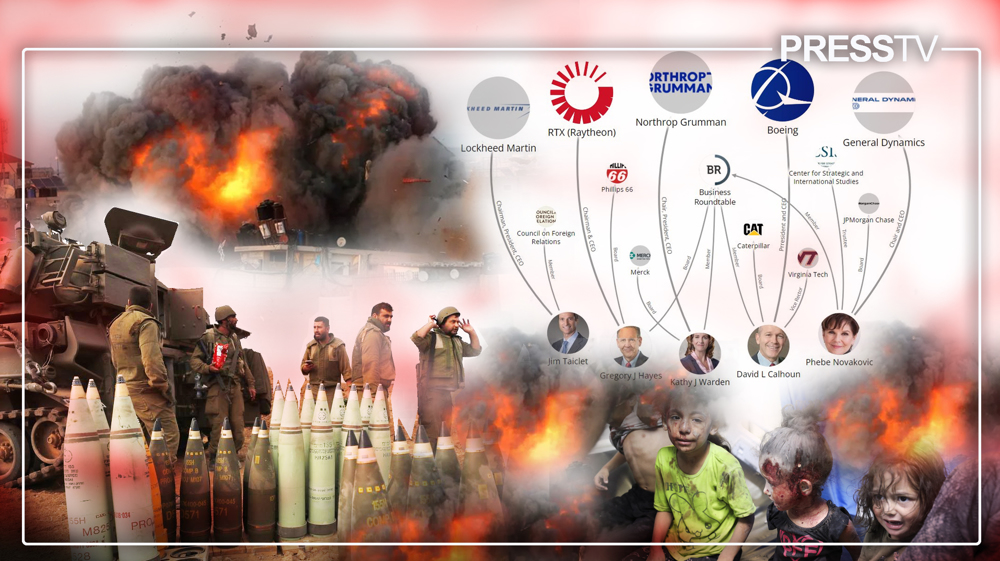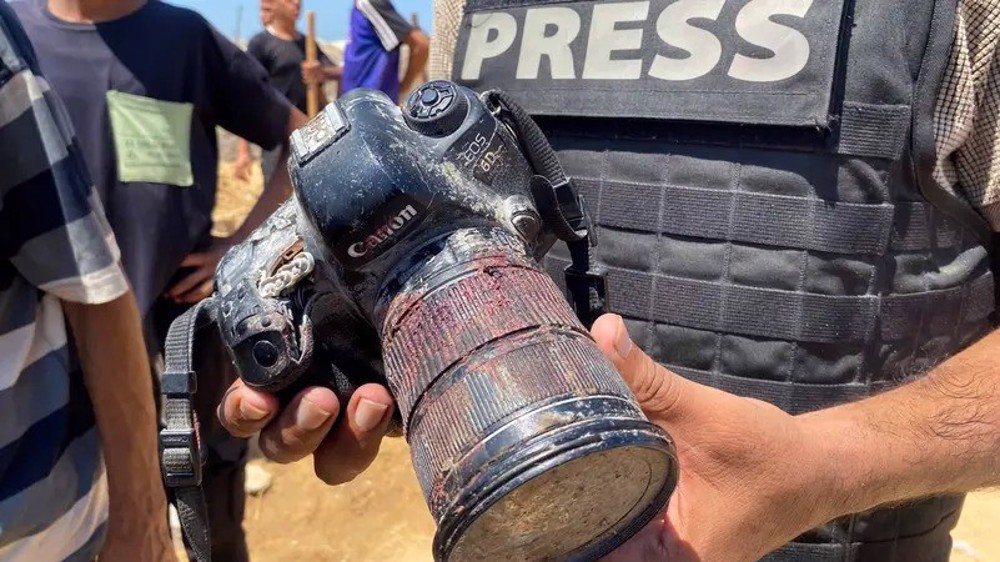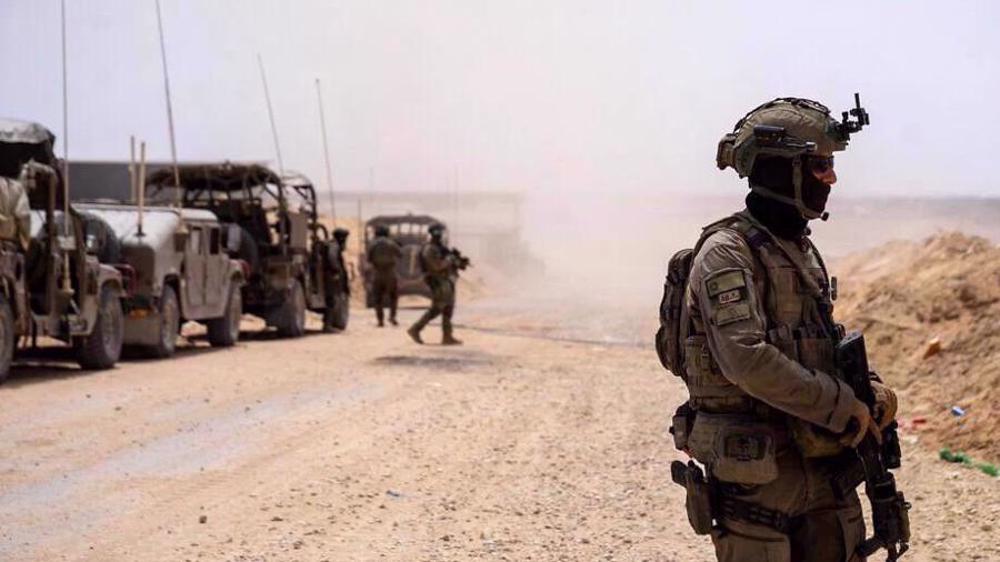War profiteering: US arms industry giants rejoice as Israel rains bombs on Gaza
By Reza Javadi
As the Israeli killing machine continues to wreak havoc in the besieged Gaza Strip, the arms manufacturers in the United States are making merry, expecting a big boost in their profits.
The United States has vowed unconditional and unwavering support to the Israeli regime in its genocidal campaign in the besieged coastal strip with top US officials dashing off to Tel Aviv in recent weeks.
US Secretary of State Antony Blinken is again in Tel Aviv, the second time in less than a month, as the Joe Biden administration seeks to assure the beleaguered regime of its support and solidarity.
One of the means of support is the supply of lethal weapons to the Tel Aviv regime, which has spread cheer on Wall Street as arms companies look for ways to maximize profits from the Gaza war.
According to a report published by The Guardian and Responsible Statecraft, major military firms in the US are eyeing big gains from the war that the Israeli regime has imposed on the people of Palestine.
After the Israeli regime launched its bombing campaign on Gaza on October 7, the stock prices of major American and European arms manufacturers have seen substantial increases.
Israel has been bombing the densely-populated civilian areas in Gaza since October 7 when the Palestinian resistance movement Hamas launched an unprecedented operation in response to the Israeli regime’s relentless crimes against Palestinians in the occupied West Bank.
The death toll in the Gaza Strip has risen over 9,500, including over 3,800 children and 2,400 women, besides leaving more than 23,500 people wounded.
It has significantly depleted the regime’s military arsenal. The refilling of these stockpiles means huge new orders of arms funded by Washington and supplied by Wall Street arms corporations.
Leading American weapons firms
Major US weapons manufacturers, such as Lockheed Martin, RTX (formerly Raytheon), Northrop Grumman, Boeing, and General Dynamics, have been singled out in a report by Eyes on the Ties.
These firms collectively reported $196.5 billion in military-related revenue last year, according to the report. All five arms corporations have a history of providing weapons to Israel for use against Palestinians and have recently been linked to weapons sales during the current Gaza assault.
"The top shareholders in these five defense companies largely consist of big asset managers, or big banks with asset management wings, that include BlackRock, Vanguard, State Street, Fidelity, Capital Group, Wellington, JPMorgan Chase, Morgan Stanley, Newport Trust Company, Longview Asset Management, Massachusetts Financial Services Company, Geode Capital, and Bank of America," the news outlet noted.
Notably, US President Joe Biden has asked the US Congress for $106 billion in military aid for Israel and Ukraine. This financial support could be a windfall for the aerospace and weapons sector, which saw a 7 percent increase in value in the immediate aftermath of Israel's attack on October 7.
Managing director and senior research analyst at TD Cowen, Cai von Rumohr was quoted as saying that the “additional demand” has been created as a result of Israel’s genocidal campaign in Gaza, noting that they “have this $106 billion request from the president.”
“The Israel situation obviously is a terrible one, frankly, and one that’s just evolving as we speak,” said Jason Aiken, the company’s executive vice president of technologies and chief financial officer, during General Dynamics’ earnings call on October 25.
“But I think if you look at the incremental demand potential coming out of that, the biggest one to highlight, and that really sticks out is probably on the artillery side.”
Aiken was quoted as saying by media outlets that they have been under pressure amid the Ukraine war, and now the Israeli war on Gaza is going to only increase that pressure.
"Obviously that's been a big pressure point up to now with Ukraine, one that we've been doing everything we can to support our Army customer,” he noted.
“We've gone from 14,000 rounds per month to 20,000 very quickly. We're working ahead of schedule to accelerate that production capacity up to 85,000, even as high as 100,000 rounds per month, and I think the Israel situation is only going to put upward pressure on that demand.”
Gaza genocide and US arms firms
The remarks were followed by protests by pro-Palestine activists outside of General Dynamics' weapons plant in Pittsfield, Massachusetts last week, with hundreds of people gathering to call for a ceasefire, holding signs with slogans like, "Genocide: Brought To You By General Dynamics."
During Raytheon's earnings call on October 24, Kristine Liwag, the Head of Aerospace and Defense Equity Research at Morgan Stanley, discussed the financial implications of the White House's $106 billion supplemental funding request about the ongoing war.
“Looking at [the White House’s $106 billion supplemental funding request], you’ve got equipment for Ukraine, air and missile defense for Israel, and replenishment of stockpiles for both. And this seems to fit quite nicely with the Raytheon Defense portfolio,” said Liwag.
Liwag also noted that the war against Palestine appeared to be an “opportunity” that “fits quite nicely” with the company’s product offerings.
It's noteworthy that Morgan Stanley owns over $3 billion worth of Raytheon stock, constituting a 2.1 percent ownership share in the weapons company.
Ignoring the earlier warnings by the United Nations Human Rights Council (UNHRC), the leaders of major weapons corporations made statements that contradict their own "statements on human rights" and their commitment to the Universal Declaration of Human Rights and the UN Guiding Principles on Business and Human Rights.
In the early days of the Israeli war against Palestinians, the UNHCR issued a warning that “there is already clear evidence that war crimes may have been committed” in Gaza, adding that those who have violated international law and targeted civilians “must be held accountable for their crimes.”
“[The UN Guiding Principles on Business and Human rights] are clear in their expectation of companies to respect human rights throughout their value chain,” said Cor Oudes, program leader of humanitarian disarmament, business conflict and human rights at PAX for Peace, a Netherland based non-governmental organization advocating for the protection of civilians against acts of war.
Israel’s military myth debunked
The Israeli regime has long boasted a formidable military establishment, which was also highlighted by the International Institute for Strategic Studies (IISS) Military Balance 2023.
The regime maintains a standing force of 169,500 active military personnel across the army, navy, and paramilitary branches, including those currently stationed close to the Gaza Strip.
The United States has played a significant role in building and supporting this military infrastructure of the Israeli regime, with trillions of dollars of military aid over the years.
As the Press TV website revealed in an investigation in August 2023, Israel has a long tradition of boasting joint projects with the US as its own, and both have a tradition of overestimating and falsifying the performance statistics of such jointly built military systems.
Iron Dome, a military system designed to intercept and destroy short-range rockets and artillery shells, has also been touted in recent years as extremely successful with "90 percent" effectiveness.
These claims come from the manufacturer and the Israeli regime, with no independent confirmation or secondary evidence to back them up.
The surprise operation by the Palestinian resistance on October 7 yet again debunked the myth of the Israeli military’s invincibility, as the much-hyped “air-defense systems” failed to intercept rockets.
According to a report by VICE, if US Congress approves Biden's request for Israel, "some of the money would be used to restock Israel's Iron Dome rocket defense system, which RTX manufactured."
"I think really across the entire Raytheon portfolio, you're going to see a benefit of this restocking. On top of what we think is going to be an increase in [US Department of Defense] top line," RTX CEO Gregory Hayes was quoted as saying.
In 2022, Israel's military expenditures amounted to $23.4 billion, according to the Stockholm International Peace Research Institute (SIPRI), an organization dedicated to conflict research.
This translates to $2,535 per capita over the 2018-2022 period, making the Israeli regime the world's second-largest per capita spender on military expenses.
During the same period (2018-2022), the Israeli regime imported $2.7 billion worth of weapons, primarily from two countries: the United States and Germany. Over three-quarters of these military imports, totaling $2.1 billion came from the US, with the remaining $546 million originating from Germany.
In a strongly worded four-page letter, former UN official Craig Mokhiber criticized the international community for failing to prevent a "genocide unfolding before our eyes" in Gaza.
Mokhiber, a US human rights lawyer, accused the US, UK, and much of Europe of being "wholly complicit in the horrific assault" on the Palestinian enclave by Israeli forces, given their continued supply of lethal arms to the occupied territories.
US, Europe arms exports to Israel
A report from SIPRI sheds light on the arms sales from Europe to Israel from 2013 to 2022. Italy and Germany have been significant suppliers of crucial weapons and equipment to the Israeli regime, which are currently being used on the ground in Gaza.
The United Kingdom, on the other hand, has lucrative deals involving the supply of equipment to the regime’s Air Force, as highlighted by the Campaign Against the Arms Trade (CAAT).
More recently, Biden requested over $14 billion in military aid for Israel's ongoing war against Palestinians. It is in addition to the $877 billion the US government allocates annually to its military.
The United States has been the all-weather supporter of the Israeli regime, providing guided missile carriers, F-35 fighters, and various other military equipment. Israel stands as the largest recipient of US foreign aid, having received approximately $263 billion between 1946 and 2023.
In 2023, US military funding to Israel reached $3.8 billion, as part of a record-breaking $38 billion deal over ten years, initially signed during the tenure of former US President Barack Obama in 2016.
Notably, half a billion of the military aid provided this year is designated for the Israeli regime's missile systems, with the commitment from Washington to replace Israeli munitions used in the ongoing war against Gaza.
Shana Marshall, an expert on finance and arms trade and the associate director of the Institute for Middle East Studies at George Washington University emphasized that the interpretation of the Universal Declaration of Human Rights largely depends on the host government.
“The Universal Declaration of Human Rights is only as good as how it’s interpreted by the host government, which in this case would be the US,” Marshall explained.
“These analysts can feel safe in the knowledge that the US government is never going to interpret that law in such a way that they will be prevented from exporting weapons to a country that the US doesn’t have an outright embargo on, which probably won’t have anything to do with human rights law anyways.”
The Leahy Law prohibits the export of US defense articles to military units complicit in human rights abuses. However, as of now, no Israeli unit has faced penalties under this law.
Pertinently, the substantial military assistance provided by the US to Israel has significant implications not only for the region but also for workers in the United States.
The effects of this support are felt across the US, impacting concerns such as healthcare, infrastructure, wages, environmental issues, and housing insecurity.
US lawmaker Summer Lee (D-Pa.) recently slammed the US arms exports to the occupied territories, stressing that it doesn't address the broader challenges faced by Americans.
Unlike the CEOs of firms like Lockheed Martin and RTX, "moms who can't afford childcare, young folks who can't pay off their debt, veterans who can't keep up with housing costs, and children who go to school hungry don't have million-dollar lobbying budgets," stated Lee.
‘Imperialist aggression': South African president calls for Maduro’s release
Foreign Press Association slams Israel's ongoing ban on media access to Gaza
VIDEO | Press TV's news headlines
European leaders condemn Trump’s expansionist threat for Greenland annexation
Iran says Israel must be held accountable for war crimes in Lebanon
US abduction of Maduro makes world less safe, signals impunity: UN
Iran’s breakthrough oral SMA drug sparks hope for rare disease patients worldwide
VIDEO | Alliance turned battlefield



















 This makes it easy to access the Press TV website
This makes it easy to access the Press TV website